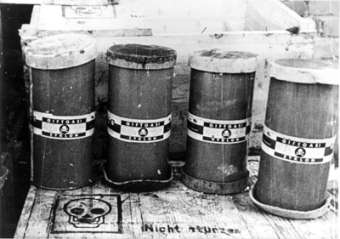Postwar Trials for Supplying Zyklon B to the SS (1946–1955)

© National Archives, Washington, DC
After the war, several employees of the companies that had supplied Zykon B to the SS in the concentration and extermination camps were brought before the court in a number of criminal trials. The first trial, of employees of the Hamburg distributorship Tesch & Stabenow (TESTA), was held before a British military court in Hamburg from March 1 to 8, 1946. The owner of the firm, Bruno Tesch, and his coworkers Joachim Hans Drosihn and Karl Weinbacher were charged with having wittingly supplied the Zyklon B used in the German concentration camps to murder citizens of the Allied countries. The defendant Joachim Hans Drosihn was acquitted in the proceedings because he was given no insight into corporate policy. Weinbacher and Tesch, on the other hand, were found guilty of knowingly supplying Zyklon B to murder human beings and were condemned to death. The sentence of death was carried out in the Hameln (Hamelin) penitentiary on May 16, 1946.
In the I.G. Farben Trial in Nuremberg in 1947/48, Heinrich Hörlein, Carl Wurster, and Wilhelm Rudolf Mann—members of I.G. Farben’s executive board and of Degesch’s supervisory board—were accused of supplying Zyklon B through Degesch to the concentration and extermination camps for the purpose of mass extermination in the gas chambers. In their verdict, however, the judges concluded that the defendants were to be acquitted of this charge. In the judges’ view, the hearing of evidence had provided no conclusive proof that the accused “had a decisive influence on the corporate policy of DEGESCH or any legally relevant knowledge of the intended purpose of their products.”[1]
The jury court in Frankfurt am Main sentenced the former general manager of Degesch, Gerhard Peters, in 1948 to five years in prison for acting as an accessory to homicide. After the West German Federal Court of Justice (Bundesgerichtshof) had quashed the decision, Peters next was sentenced by the jury court in Wiesbaden on August 7, 1953, to six years in prison for acting as an accessory to murder. In a new trial, Peters finally was acquitted in May 1955. The Frankfurt jury court assumed that the shipments of Zyklon B for which Peters was responsible were not used for the mass murder in the gas chambers. The statement of a witness who provided evidence to the contrary was not taken into consideration.
(FS; transl. KL)
















